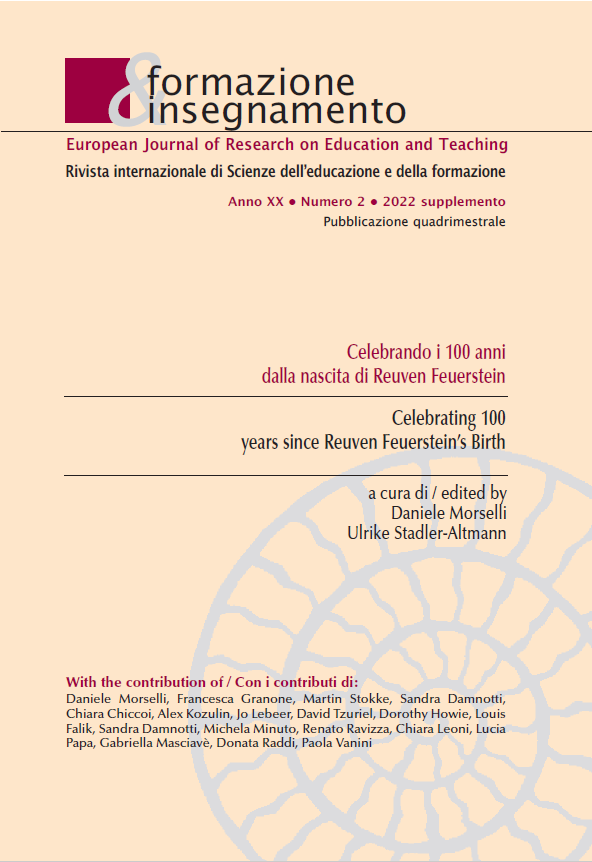Lesson planning: from the Feuerstein Method to the Curricular Lesson
DOI:
https://doi.org/10.7346/-feis-XX-02-22_08Keywords:
Feuerstein method, Mediated Learning, Lesson planning, Metacognition, TeachingAbstract
This contribution shows a possible application of the Feuerstein methods in curricular teaching. In schools, there is a growing interest in the development of students’ propensity to learn, and results of evidence-based studies show that interactive approaches and conscious organization of the contents are key features of an effective lesson. A significant example of a dialogical modality of interaction and application of lesson planning is Feuerstein Instrumental Enrichment. The lesson planning, which is not popular in Italy, can be a chance for the teacher to develop a better awareness of the learning process in the classroom. Moreover, this contribution argues that the phases of the lesson as Feuerstein conceived decades ago are confirmed by the recent evidence-based research, thus showing how the enhancement of thinking is related not only to the curricular activities and contents, but also to the learning path designed wilfully by the teacher. Such path is articulated in phases, has explicit objectives, and is flexible and highly dialogical.
References
Calvani, A.(2014). Come fare una lezione efficace. Roma: Carocci.
Calvani, A. & Trinchero, R. (2019). Dieci falsi miti e dieci regole per insegnare bene. Roma: Carocci.
Csibra, G., & Gergely, G. (2011). Natural pedagogy as evolutionary adaptation. Philosophical Transactions of The Royal Society Biological Sciences. B 366: 1149–57.
http://doi.org/10.1098/rstb.2010.0319
Dehaene, S. (2019). Imparare. Milano: Cortina.
Feuerstein, R., Falik, L., Rand, Y., & Feuerstein, R.S. (2008). Il Programma di Arricchimento
Strumentale di Feuerstein. Trento: Erickson.
Feuerstein, R., Feuerstein, R.S., & Falik, L. (2010). Beyond smarter:Mediated Learning and the Brain’s Capacity for Change. New York: Teachers College Press.
Fischer, R. (1998). Thinking about Thinking: Developing Metacognition. Children Early Child Development and Care,141 (1):1-15. https://www.researchgate.net/publication/233466909_Thinking_About_Thinking_Developing_Metacognition_in_Children
Gagné, R. M., Briggs, L. J., & Wager, W. W. (1992). Principles of instructional design (4th ed.). Forth Worth, TX: Harcourt Brace Jovanovich College Publishers.
Gardner, H. (2007). Cinque chiavi per il futuro. Milano: Feltrinelli.
Hattie, J. (2016). Apprendimento visibile, insegnamento efficace. Trento: Erickson.
Hoppitt, W.J., Brown, G.R., Kendal, R., Rendell, L., Thornton, A., Webster, M.M., & Laland, K.N. (2008). Lessons from animal teaching. Trends Ecol Evol. Sep;23(9):486-93.
https://lalandlab.st-andrews.ac.uk/files/2015/08/Hoppitt_et_al_TREE_2008.pdf
Minuto, M., & Ravizza, R. (2008). Migliorare i processi di apprendimento. Il Metodo Feuerstein dagli aspetti teorici alla vita quotidiana. Trento: Erickson.
Minuto, M. and Ravizza, R. (2014). A cosa servono le domande?, Psicologia dell’educazione, Vol.8 n°3 dicembre, 341-356.
Minuto, M., & Ravizza, R.(2020). Il lesson planning, consigli per l’uso. Le guide Sei: Strumenti operativi per una nuova didattica, S37-S47.
Morin, E. (2001). I sette saperi necessari all’educazione del futuro. Milano: Cortina.
Oliverio, A. (2017). Il cervello che impara. Firenze: Giunti.
Piaget, J. (2000). Lo sviluppo mentale del bambino. Torino: Einaudi.
Rivoltella, P. C. (2012). Neurodidattica. Insegnare al cervello che apprende. Milano: Cortina.
Sternberg, R. J., & Spear-Swerling, L. (1997). Le tre intelligenze. Trento: Erickson.
Sweller, J., van Merriënboer, J. J. G., & Paas, F. (2019). Cognitive architecture and instructional design: 20 years later. Educational Psychology Review, 31, 261–292.
https://ro.uow.edu.au/sspapers/4554/
Walsh, J.A., & Sattes, B.D. (2011). Thinking Through Quality Questioning. Deepening Student Engagement. Thousand Oaks (CA): Corwin.
Vygotsky, L.S. (1986). Thought and Language. Cambridge: MIT Press.
Downloads
Published
How to Cite
Issue
Section
License
Copyright (c) 2022 Michela Minuto, Renato Ravizza

This work is licensed under a Creative Commons Attribution 4.0 International License.
Formazione & insegnamento is distributed under Attribution 4.0 International (CC BY 4.0).
For further details, please refer to our Repository & Archiving Policy, as well as our Copyright & Licensing Terms.





